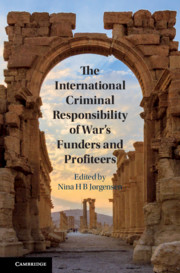Book contents
- The International Criminal Responsibility of War’s Funders and Profiteers
- The International Criminal Responsibility of War’s Funders and Profiteers
- Copyright page
- Contents
- Illustrations
- Contributors
- Acknowledgements
- Abbreviations
- Introduction
- Part I Financiers and Profiteers after World War II
- Part II Arms Fairs and ‘Flying Money’
- Part III Developing the Available Law
- Part IV Where Should the Buck Stop?
- Part V Criminal Accountability and Beyond
- Part VI Discovering and Recovering the Profits of War
- 16 Catching War’s Funders and Profiteers
- 17 Asset Recovery at International(ised) Criminal Tribunals
- 18 Reparation Mechanisms for Victims of Armed Conflict
- Conclusion The Relationship between Economic and Atrocity Crimes
- Index
17 - Asset Recovery at International(ised) Criminal Tribunals
Fines, Forfeiture, and Orders for Reparations
from Part VI - Discovering and Recovering the Profits of War
Published online by Cambridge University Press: 18 September 2020
- The International Criminal Responsibility of War’s Funders and Profiteers
- The International Criminal Responsibility of War’s Funders and Profiteers
- Copyright page
- Contents
- Illustrations
- Contributors
- Acknowledgements
- Abbreviations
- Introduction
- Part I Financiers and Profiteers after World War II
- Part II Arms Fairs and ‘Flying Money’
- Part III Developing the Available Law
- Part IV Where Should the Buck Stop?
- Part V Criminal Accountability and Beyond
- Part VI Discovering and Recovering the Profits of War
- 16 Catching War’s Funders and Profiteers
- 17 Asset Recovery at International(ised) Criminal Tribunals
- 18 Reparation Mechanisms for Victims of Armed Conflict
- Conclusion The Relationship between Economic and Atrocity Crimes
- Index
Summary
This chapter critically examines the development of the fine and asset forfeiture measures in both the constituent instruments and case law of international(ised) criminal tribunals since Nuremberg. The chapter demonstrates that such procedures have been underutilised in practice, even though many perpetrators of international crimes were, in fact, solvent. While recognising that the origins of international criminal law were chiefly retributive, in light of the fine and asset forfeiture regimes found in the frameworks of a number of international(ised) criminal tribunals, the chapter contends that the Court's fine and asset forfeiture powers were intended by its founders to constitute a vital part of its reparative mandate. The chapter concludes that fine and asset forfeiture powers cannot be viewed as outer limits of international criminal justice, but must rather be seen as foundational to this project.
Keywords
- Type
- Chapter
- Information
- Publisher: Cambridge University PressPrint publication year: 2020

